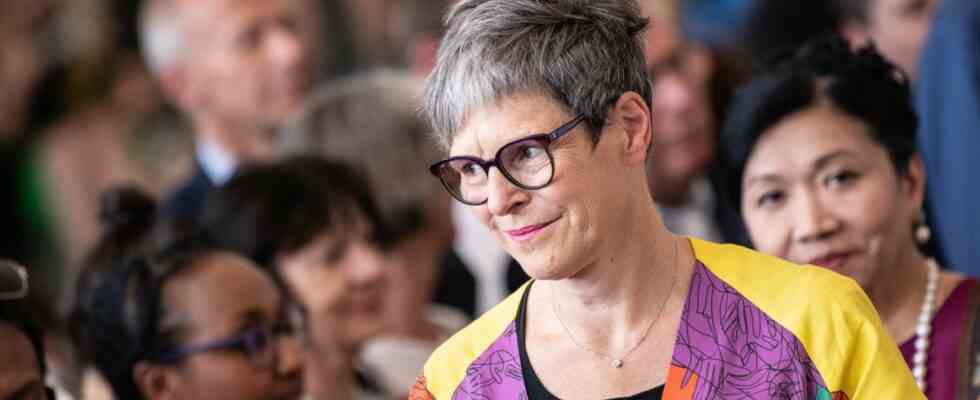Four weeks after the documenta in Kassel fell into the worst crisis in its history, the show’s general director, Sabine Schormann, is being replaced. On Friday evening, the documenta supervisory board met for a meeting that is said to have lasted six hours. The result was finally announced on Saturday afternoon: It was “mutually” agreed to end Schormann’s contract “at short notice”. This is the step that has finally been taken that has seemed inevitable to almost everyone since the discovery of the anti-Semitic caricatures on the large banner “People’s Justice” by the Indonesian collective Taring Padi – except for Schormann himself and Kassel’s mayor Christian Geselle. Since January there had been speculation about supposedly anti-Israel or even anti-Semitic tendencies among the curators. At the time, Schormann had promised that there would be no anti-Semitism at the Documenta. Then there was him. She couldn’t have disqualified herself more clearly.
And yet, despite the seriousness of the situation, Friday’s meeting brought little clarity. Even Schormann’s withdrawal is only announced in the statement, it doesn’t seem to have happened yet. She is apparently to remain in office until a replacement is found (“First, an interim successor is sought”). The fact that journeyman, the chairman of the supervisory board, and his deputy, Hesse’s art minister Angela Dorn, could not name a name on Friday, even though the misery has lasted a month, says a lot about their idea of crisis management.
A third of the total duration of the Documenta has already elapsed under the thunder of the scandal. A dangerous process of erosion has long been underway since Meron Mendel, who was initially asked for help and then abandoned, gave up as an adviser on anti-Semitism issues and had the most prominent artist in the show, Hito Steyerl, remove her works from the show. Nevertheless, those responsible continue to take their time. And as in the last four weeks, please don’t ask me any annoying questions. “Public statements” will “not exist for the time being”, “internal communication” is “in the foreground”. The “World Art Show”, financed with 25 million euros in tax money, is run like a private museum.
As long as the question of leadership has not been clarified, nothing will happen
As far as the anti-Semitism cases in the exhibition are concerned, the statement of the supervisory board remains with the euphonious but nebulous song of “enlightenment”, “processing” and regaining “trust”. Concrete steps, names, measures are not mentioned. As long as the question of leadership has not been clarified, nothing will happen.
Some of the problems of documenta fifteen go back many years. They began with the federal government having only two seats on the twelve-member supervisory board, while the remaining ten seats are occupied by mostly non-specialist local and state politicians. Frustrated by the lack of influence, the federal government left the committee – a step that Minister of State for Culture Claudia Roth wants to reverse as part of a comprehensive reform.
The board of directors was courageous enough to support the now damned decision of its selection committee to hand over the Documenta to the Indonesian artists’ collective Ruangrupa. But then he didn’t bother to create the structures in which Ruangrupa could have worked successfully. Although Schormann was adorned with the title “General Director”, she only felt responsible for organization and finances. The Indonesian curators were largely left alone with the task of navigating the cultural flagship Documenta through the unfamiliar, whipped-up German waters – no wonder they ran aground.
It took two: one to walk in the trap – and one to let it run in
That Schormann justified her non-supervision again and again with the “freedom of art” is hypocrisy. Art is not a game played by autistic people, but has a lot to do with communication, and nowhere is that more true than at documenta fifteen. But communication is only possible if you adjust to your counterpart. The fact that Ruangrupa didn’t find out more, that they declared the loss of control a principle and neither knew what was being hung up in the middle of Friedrichsplatz nor recognized it as anti-Semitic, shows amazing naivety. But Schormann should never have let her fall into this trap, not least because of her responsibility for the Documenta.
Equally unforgivable, four weeks after removing “People’s Justice,” she has taken no steps to have two other problematic works assessed by professionals, either removed from the exhibition or plausibly explained to visitors as to their content. Instead, she hoped to sit out the scandal, didn’t answer the phone for weeks, trivialized the problems, blackened employees, curators, even the Minister of State for Culture for their own failings. As a result, voices became louder and louder that not only the entire Documenta, but also other institutions were suspected of being anti-Semitic.
It will be all the more difficult to find someone willing and able to clean up the mess Schormann left behind in just two months.

